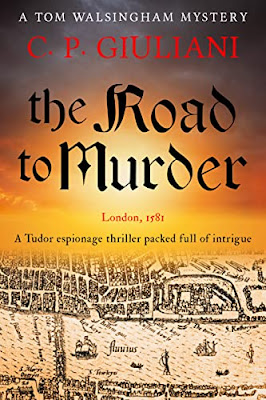Tell us about your latest book
The Road to Murder is the first in a series, the Tom Walsingham Mysteries. It’s part good old murder mystery, part espionage thriller, set in the early 1580s between England and France.
In this first instalment, nineteen-year-old Tom is working as a diplomatic courier for his powerful kinsman, secretary of state and spymaster Sir Francis Walsingham. Tasked with escorting to Paris the Queen of Navarre’s new English glove-maker, Tom thinks he’s in for a mundane, rather boring journey. Last famous words! Soon he and his party are ambushed in the woods of Picardy, people start turning up dead, and things in general begin to look like a conspiracy against Queen Elizabeth… Only, not all is as it seems, and Tom, left without orders or official papers, will have the devil of a time, racing back to England before the culprits can wreak more havoc.
Thomas Walsingham is a real-life character, like a good few others in the book, and The Road to Murder is loosely based on episodes in his life.
What is your preferred writing routine?
I must confess that I don’t have much in the way of routines. I work in a theatre, and also as a freelance editor and translator – a combination that makes for rather erratic schedules… My one constant is that I write and/or do research every single day. I take notes (oodles of them!), plot, and sketch scenes in longhand in a notebook, and then do the actual writing at my computer, while drinking cup after cup of tea. Not terribly methodical, perhaps – but it works for me.
What advice do you have for new writers?
Read, read, read. Write, write, write. Learn the craft, and always be willing to step out of your comfort zone. I used to have a mentor, a wonderful person who never allowed me to take the easier route. It was uncomfortable at times, but it taught me a valuable lesson that I try to live and work by – and to pass on whenever I can: it pays to always challenge oneself a little harder.
What have you found to be the best way to raise awareness of your books?
I’m still rather new to the game. I published three historical novels in Italy, back in the day, but that was before things like Goodreads and Twitter became so vital to publishing. The Road to Murder is the first novel I’ve published in some time, and my very first in English. I incline to believe that word-of-mouth 2.0 may just be the ticket: reviews, blogging, social reading, book blogs such as The Writing Desk… I’ll find out with time, I guess.
Tell us something unexpected you discovered during your research
One of the joys of writing historical fiction is the endless treasure hunt that is research. You never know what you’ll find when you delve through books, documents, and the Internet. One favourite nugget I recently unearthed, while combing through the Calendar of State Papers for Scotland, was the record of a street brawl between a Scottish ambassador’s men and a few hot-blooded citizens of Durham, in the summer of 1583. One of the Scots made a deposition before the local City magistrates, complete with a blow-by-blow description of the action, wonderful dialogue, and Scottish brogue: it was very much like a curtain opening on a vivid slice of real-life swashbuckling!
What was the hardest scene you remember writing?
In The Road to Murder I thought I’d never manage the couple of scenes I set in Montreuil-sur-Mer, a small French town where Tom gets in trouble. I wanted to know what the place looked like in 1581, where the gaol would be, and the gates, and so on – and could find no reliable documentation. Earlier, yes; later, enough to drown in it – but nothing about ‘my’ time, when I knew that Montreuil had been extensively rebuilt. At one point I tried to settle for a combination of vagueness and guesswork, and still wasn’t satisfied. It just didn’t feel right. In the end I wrote to the local museum, and found this incredibly generous curator, who shared with me his knowledge, his historical maps, whole chapters of local history books… I ended up spending ages on the Montreuil scenes – but they are all the better for it.
What are you planning to write next?
I’ve just handed in Book 2 of the Tom Walsingham Mysteries, A Treasonous Path, due out later this year, always with Sapere Books. Now I’m up to my ears in research for Book 3, and more mayhem for Tom to unravel. Meanwhile, I plan to devote some time to my new-found love for flash fiction, and I also have a play in the works… Never a minute of boredom!
C. P. Giuliani
C. P. Giuliani lives in Mantua, Italy, and began by studying the Classics and International Relations – and then swerved to the timber trade first, and later the pen and the stage. A passion for history and stories has led her to write historical fiction both in Italian and English. She also writes, directs, teaches playwriting, does backstage work, and very occasionally understudies with Mantua’s historic Compagnia Campogalliani. Find out more from her website https://claragiuliani.com/ and find her on Twitter @laClarina



No comments:
Post a Comment
Thank you for commenting